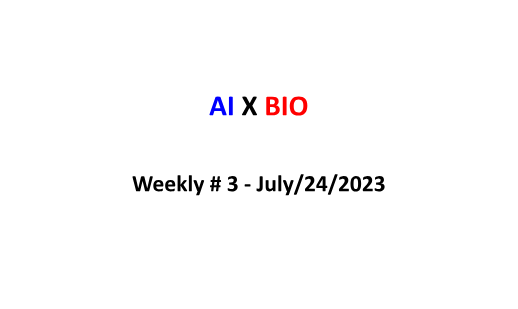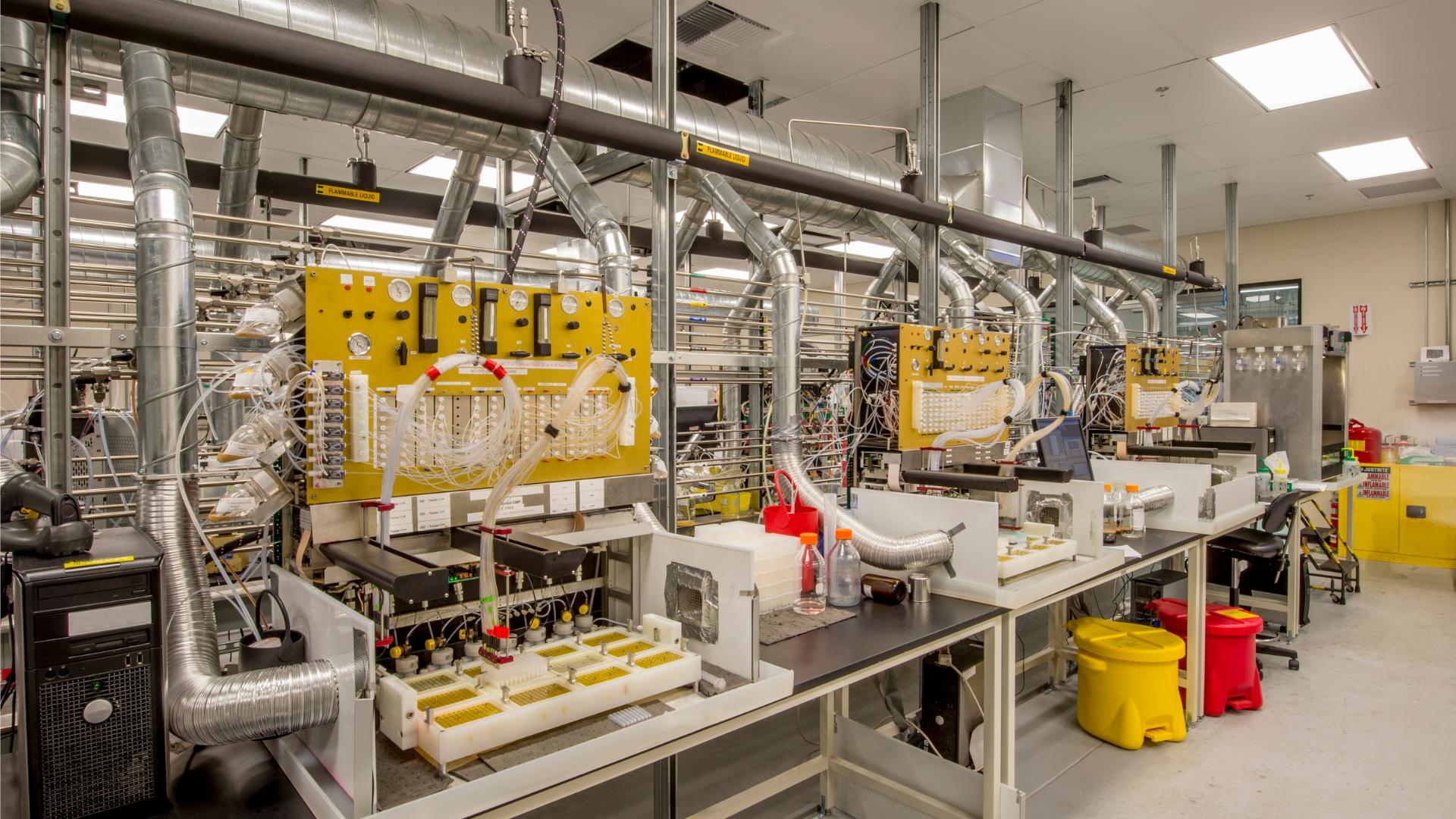- AIXBIO
- Posts
- AIXBIO Weekly #3 - July/24/2023
AIXBIO Weekly #3 - July/24/2023

Featured
Ethics & Regulation
AI Giants Pledge Responsible Innovation to the White House
In a significant move towards responsible AI innovation, seven leading American companies, including Amazon, Anthropic, Google, Inflection, Meta, Microsoft, and OpenAI, have voluntarily committed to a series of measures proposed by the White House. These measures aim to address the risks posed by artificial intelligence while harnessing its potential benefits. The commitments include investments in cybersecurity, discrimination research, and a new watermarking system to inform users when content is AI-generated.
The companies have agreed to these measures voluntarily, and there are currently no consequences if they fail to uphold their promises. However, they are expected to start implementing these commitments immediately. The White House has also indicated that it is working on an executive order to address some of the risks posed by AI, with actions potentially spanning across federal agencies and departments.
#AI #ArtificialIntelligence #WhiteHouse #CyberSecurity #DiscriminationResearch #WatermarkingSystem #Safety #Security #Trust #Education #Jobs #Cancer #ClimateChange
Authors Sue OpenAI Over Alleged Copyright Infringement
Authors Mona Awad and Paul Tremblay have filed a lawsuit against OpenAI, alleging that the AI company infringed their copyright by training its language model, ChatGPT, on their novels without permission. The authors claim that their copyrighted works were unlawfully used to train ChatGPT, as evidenced by the AI's ability to generate accurate summaries of their books. This lawsuit, the first of its kind against ChatGPT, could potentially redefine the legal boundaries of generative AI. The authors' lawyers argue that OpenAI profits unfairly from stolen writing and ideas and are seeking monetary damages on behalf of all US-based authors whose works were allegedly used to train ChatGPT. However, proving financial loss due to ChatGPT's training on copyrighted material could be challenging. The case may hinge on whether the use of copyrighted material in this manner constitutes 'fair use' or unauthorized copying. The outcome of this lawsuit could have significant implications for the use of AI in content generation. #AI #OpenAI #CopyrightInfringement #ChatGPT
Partnerships
Ginkgo Bioworks Secures $18M DARPA Contract for Protein Manufacturing Innovation
Ginkgo Bioworks, a leader in cell programming and biosecurity, has been awarded an up to $18 million contract by the Defense Advanced Research Projects Agency (DARPA). The four-year deal is part of DARPA's Reimagining Protein Manufacturing (RPM) project, with Ginkgo set to pioneer advancements in on-demand protein manufacturing through Cell-Free Protein Synthesis (CFPS). The company's goal is to revolutionize protein manufacturing, enabling rapid, high-yield, and distributed production of human therapeutic proteins. This is particularly crucial for national security objectives. Ginkgo will collaborate with Imperial College London, Nature’s Toolbox, Inc., and Michael Feldhaus, a seasoned consultant and former Executive VP of Antibody Discovery at Adimab. The project will focus on therapeutic proteins with "post-translational modifications," such as antibodies, cytokines, and clotting factors. These proteins are vital in treating cancer and autoimmune diseases. Ginkgo aims to replace traditional cell-based methods with more efficient cell-free methods, leveraging its high-throughput, automated Foundry and proprietary genetic data Codebase. The ultimate goal is to develop production methods that align with Good Manufacturing Practices, facilitating adoption by the pharmaceutical industry. #GinkgoBioworks #DARPA #Protein #SyntheticBiology #Biosecurity
BioSig AI Sciences Joins NVIDIA Inception Program to Boost AI Medical Device Development
BioSig Technologies, Inc., a medical technology company known for its precision in intracardiac signal visualization, announced that its subsidiary, BioSig AI Sciences, Inc. (BAIS), has been selected to join NVIDIA Inception. This program is designed to partner with companies revolutionizing industries with advancements in artificial intelligence (AI) and data sciences. NVIDIA Inception supports emerging-growth companies during critical stages of product development, prototyping, and deployment by providing engineering guidance, technical training, hardware and software support, co-marketing, and exposure to the NVIDIA investment community.
Key Moves, Transitions
Verily's Vision for Precision Health and the Role of AI
Verily, an Alphabet precision health technology company is at the forefront of transforming healthcare through the use of digital tools and data science. Recently, they announced the appointment of Laura O’Donnell as General Counsel, who brings with her a wealth of legal and compliance expertise from her time at McKesson and GE Healthcare. Her experience in transforming companies' approaches to regulatory and operational excellence will be crucial as Verily continues to advance its precision health strategy.
Research
Exscientia Launches EXCYTE-1, a Prospective Observational Study in Ovarian Cancer
Exscientia, a leading AI-driven precision medicine company, has announced the initiation of EXCYTE-1, a prospective observational study in ovarian cancer. The study aims to investigate the relationship between ex vivo drug response (EVDR) in primary tumour-derived samples using the company’s precision medicine platform and actual patient clinical response. The study will be conducted in collaboration with the Arbeitsgemeinschaft Gynäkologische Onkologie (AGO) Study Group, a leading non-profit clinical research network in gynaeco-oncology worldwide #ClinicalTrials
Future
AI and Quantum Tech: A New Era in Healthcare
In a recent article on SandboxAQ, the potential of AI and Quantum (AQ) technologies to revolutionize patient care is explored. The article highlights how AQ technologies can accelerate the drug discovery process, which traditionally is a time-consuming and costly endeavor. By digitally modeling and simulating molecular structures, new compounds could be synthesized in days instead of years, and testing could be improved, expediting the pathway to human trials.
The article also discusses the potential of quantum sensors in medical imaging and diagnostics and the need for quantum-resistant cybersecurity to protect sensitive healthcare data. Furthermore, AQ technologies could aid in predicting and responding to public health emergencies, such as pandemics. The article emphasizes the need for global collaboration among various sectors to fully realize the benefits of AQ technologies in healthcare. #AI #QuantumTech #Healthcare #DrugDiscovery #MedicalImaging #Cybersecurity #PublicHealth





